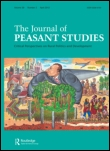
JOURNAL OF PEASANT STUDIES
Scope & Guideline
Charting the Path of Social Transformations in Agriculture
Introduction
Aims and Scopes
- Critical Agrarian Studies:
The journal publishes research that critically examines the dynamics of agrarian change, including the impact of neoliberal policies, land reform, and agrarian movements. It addresses the implications of these changes for rural communities and food systems. - Social Justice and Peasant Rights:
A significant focus is placed on the rights of peasants, indigenous communities, and marginalized groups, exploring themes of social justice, land tenure, and food sovereignty within the context of global capitalism. - Environmental Politics and Sustainability:
The journal investigates the environmental dimensions of agrarian practices, including issues related to climate change, biodiversity conservation, and sustainable agricultural practices, highlighting the tensions between ecological sustainability and economic development. - Intersectionality in Agrarian Contexts:
Research often incorporates intersectional analyses, considering how factors such as gender, class, race, and ethnicity shape agrarian experiences and struggles, thereby enriching the discourse on social reproduction and labor dynamics. - Global and Local Perspectives:
The journal emphasizes both global frameworks and localized case studies, providing a platform for diverse voices and experiences from various geographical contexts, from rural Asia and Africa to Latin America and beyond.
Trending and Emerging
- Climate Justice and Agrarian Movements:
Recent publications increasingly focus on the intersections between climate justice and agrarian movements, exploring how peasant and indigenous communities are responding to environmental crises and advocating for sustainable practices. - Digitalization and Data Politics in Agriculture:
There is a growing interest in the implications of digital technologies and datafication for agriculture, including how these technologies affect peasant livelihoods, land rights, and food sovereignty. - Gender and Feminist Perspectives:
Research highlighting gender dynamics within agrarian contexts is on the rise, particularly studies that examine the roles of women in food sovereignty movements and the impact of agrarian change on gender relations. - Transnational Solidarity and Global Networks:
Emerging themes include the exploration of transnational solidarity among peasant movements and the role of international networks in supporting local struggles against dispossession and environmental degradation. - Political Economy of Food Systems:
A trend towards analyzing the political economy of food systems is evident, particularly in relation to issues of food sovereignty, global supply chains, and the impact of agribusiness on smallholder farming.
Declining or Waning
- Traditional Agricultural Practices:
There has been a noticeable decline in papers focusing solely on traditional agricultural practices without critical engagement with contemporary issues such as climate change or market dynamics, indicating a shift towards more complex analyses of agrarian transformations. - Simplistic Narratives of Peasant Resistance:
Research that presents overly simplistic narratives of peasant resistance, without acknowledging the multifaceted realities and internal diversities within peasant movements, appears to be decreasing as scholars seek more nuanced and critical perspectives. - Regional Studies with Limited Global Context:
There is a waning interest in regional studies that do not connect to global issues or frameworks, as the journal increasingly prioritizes research that situates local struggles within broader global political economies. - Focus on Historical Case Studies:
While historical analyses remain important, there is a decreasing emphasis on purely historical case studies that do not engage with contemporary agrarian issues or movements, suggesting a preference for research that addresses current challenges.
Similar Journals
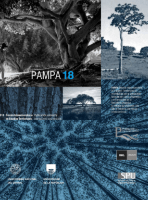
Pampa
Connecting Scholars: Open Access Insights into Regional and Environmental Studies.Pampa is a distinguished academic journal dedicated to the exploration and dissemination of research across various disciplines, with a special focus on regional studies and environmental issues prevalent in the Pampas region of Argentina. Published by EDICIONES UNL, this open access journal has been providing researchers, professionals, and students with vital insights and current developments in the field since its inception in 2005. With its ISSN 1669-3299 and E-ISSN 2314-0208, Pampa prioritizes accessibility and visibility, ensuring that scholarly work is freely available to a global audience. Researchers are encouraged to submit their findings and contribute to the ongoing dialogue within this vibrant and critical area of study. By promoting open access to significant research, Pampa enhances collaborative efforts and fosters innovation within the academic community.

Economia Agraria y Recursos Naturales
Empowering Voices in the Quest for Environmental SolutionsEconomia Agraria y Recursos Naturales, published by UNIV POLITECNICA VALENCIA, EDITORIAL UPV, is a prominent open-access journal that has been serving the fields of agricultural and biological sciences, environmental science, and geography since 2001. With an ISSN of 1578-0732 and an E-ISSN of 2174-7350, this journal is dedicated to publishing high-quality research that contributes to the sustainable management of natural resources and agricultural practices. The journal invites scholars, practitioners, and students to explore and share innovative findings that address pressing environmental challenges. While currently categorized in the lower quartiles (Q4) for various disciplines in 2023, its open-access model ensures wide dissemination and visibility for authors and their work, aligning with the growing trend towards accessibility in academic publishing. Positioned in Spain, Economia Agraria y Recursos Naturales is a valuable resource for those seeking to engage with the intersection of agriculture, environmental studies, and policy planning within a global context.
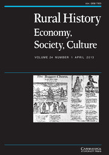
Rural History-Economy Society Culture
Exploring the Tapestry of Rural Life Through History, Economy, and Culture.Rural History: Economy Society Culture is a vital academic journal dedicated to exploring the multifaceted aspects of rural history from economic, societal, and cultural perspectives. Published by Cambridge University Press, this journal contributes substantially to the field by presenting innovative research that spans a range of disciplines, including history, geography, and urban studies. With a convergence of scholarship from 1990 through 2024, this journal holds significant rankings in the top quartiles of its categories, particularly excelling in History where it ranks in the Q2 quartile. It also demonstrates respectable positions in other arts and humanities domains, reflecting its considerable impact, especially in history-related studies, where it sits in the 76th percentile. While not open access, it provides valuable insights for researchers, professionals, and students passionate about understanding the dynamics of rural societies and their historical underpinnings. For scholars aiming to contribute to this rich dialogue, Rural History serves as an essential platform for disseminating significant findings and advancing knowledge in the field.

Debates en Sociologia
Igniting Conversations on Contemporary Social IssuesDebates en Sociologia is a prominent peer-reviewed journal that serves as a vital platform for sociological discourse and research in the Latin American context. Published by the Pontificia Universidad Católica del Perú, this esteemed journal has embraced an Open Access model since 2005, ensuring that scholars and policymakers have unrestricted access to its rich array of articles advancing contemporary sociological thought and practice. The journal encourages submissions that stimulate critical discussions about social issues, offering a space for innovative research, theoretical explorations, and empirical studies. With its ISSN 0254-9220 and E-ISSN 2304-4284, Debates en Sociologia is committed to enhancing the visibility of research in sociology, thus making significant contributions to both regional and global academic dialogues. Its dedication to fostering interdisciplinary connections within the social sciences highlights the journal's importance for researchers, professionals, and students seeking to expand their understanding of sociological phenomena.

CANADIAN GEOGRAPHIES-GEOGRAPHIES CANADIENNES
Navigating the Intersections of Geography and SocietyCanadian Geographies-Geographies Canadiennes, published by Wiley, stands as a prominent peer-reviewed journal dedicated to advancing knowledge in the fields of geography and environmental studies. With an ISSN of 0008-3658 and an E-ISSN of 1541-0064, this journal has been an essential resource since its inception in 1950, reflecting on geographical phenomena and their implications in the context of Canadian landscapes and beyond. The journal boasts a consistent reputation, classified in the Q2 category within both Earth-Surface Processes and Geography, Planning and Development, as of 2023. Additionally, it ranks impressively within Scopus, holding the 75th percentile in Social Sciences and 70th in Earth and Planetary Sciences. Although it does not offer open access, its rigorous editorial standards ensure high-quality research contributions for academics and practitioners aiming to explore the complexities of geographical studies. With its headquarters located in Hoboken, NJ, this journal not only underscores the significance of geographical research in North America but also provides a platform for interdisciplinary collaboration among researchers, professionals, and students in the increasingly vital field of geography.

Simbiotica
Fostering collaboration for ecological breakthroughs.Simbiotica, published by Universidade Federal do Espírito Santo, is an esteemed open-access journal that has been contributing to the advancement of interdisciplinary studies since its inception in 2012. With the ISSN 2316-1620, this journal stands at the forefront of environmental and biological research, offering a platform for scholars and practitioners to share innovative findings and methodologies. Although currently lacking an official H-index, Simbiotica is focused on promoting accessible research that informs policies and fosters sustainable practices. Set in the vibrant academic landscape of Brazil, the journal brings together a diverse range of topics, emphasizing the importance of collaborative approaches in tackling contemporary ecological challenges. With an open-access model, it ensures that knowledge is disseminated widely, benefiting researchers, professionals, and students alike.

Revista Brasileira de Educacao do Campo-Brazilian Journal of Rural Education
Advancing equitable education for rural communities.Revista Brasileira de Educação do Campo - Brazilian Journal of Rural Education, published by Universidade Federal de Tocantins (UFT) since 2016, is a distinguished open access journal aimed at advancing research and scholarship in the field of rural education. With its commitment to enhancing educational practices and policies in rural settings, this journal serves as a vital platform for researchers, educators, and policymakers to share their findings and innovations. By embracing a diverse range of interdisciplinary perspectives, the journal seeks to address the unique challenges and opportunities faced by rural educators in Brazil and beyond. The journal's dedication to open access ensures that the knowledge produced is widely disseminated, fostering a rich dialogue within the educational community. As the field of education continues to evolve, Revista Brasileira de Educação do Campo stands at the forefront, championing the importance of equitable and inclusive education for all learners.
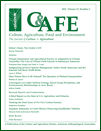
Culture Agriculture Food and Environment
Unraveling the Cultural Threads of Agriculture and EcologyCulture Agriculture Food and Environment, published by WILEY, is an esteemed journal that serves as a pivotal platform for interdisciplinary research at the intersection of cultural studies, anthropology, and agricultural sciences. With its ISSN 2153-9553 and E-ISSN 2153-9561, this journal aims to foster scholarly dialogue on the complex relationships between food, culture, and environmental sustainability. As of 2023, it proudly holds a Q2 ranking in Agricultural and Biological Sciences and Anthropology, as well as a Q1 ranking in Cultural Studies, indicating its significant impact within these disciplines. Researchers and professionals will appreciate its rigorous peer-review process and diverse coverage, which extends from 2011 to 2024, reflecting ongoing debates and innovations in the field. Although open access options are not provided, the journal's commitment to advancing knowledge in understanding food systems and cultural practices makes it a vital resource for academics and practitioners alike, promoting a deeper understanding of the cultural dimensions of agriculture and the environment.

Anduli
Fostering Global Conversations in CommunicationAnduli is a prominent academic journal published by the University of Sevilla, Faculty of Communication, dedicated to exploring the multifaceted realm of communication studies. With its commitment to Open Access since 2002, the journal ensures that its scholarly content is readily available to researchers, professionals, and students globally, fostering an inclusive dialogue around contemporary communication issues. The journal holds an ISSN of 1696-0270 and an E-ISSN of 2340-4973, which signifies its credibility and reach within the academic community. Although specific impact metrics such as HIndex and Scopus ranks are currently unavailable, Anduli is recognized for its significant contribution to the development and dissemination of knowledge in communication disciplines. By publishing original research articles, reviews, and critical essays, the journal aims to address emergent trends and challenges in communication, making it an indispensable resource for scholars and practitioners alike. Whether you are delving into media studies, intercultural communication, or digital discourse, Anduli stands as a vital outlet for innovative research and thought leadership.
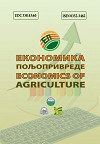
Ekonomika Poljoprivreda-Economics of Agriculture
Championing Open Access Research in Agricultural EconomicsEkonomika Poljoprivreda-Economics of Agriculture is a pivotal journal in the field of agricultural economics, dedicated to advancing knowledge and research in this critical area of study. Published by the Balkan Scientific Association of Agrarian Economists, this esteemed journal plays a vital role in disseminating Open Access research since 2014, ensuring that findings are accessible to a global audience. With its ISSN 0352-3462, the journal focuses on a diverse range of topics within agricultural economics, aiming to bridge theoretical frameworks with practical applications that address contemporary challenges in the sector. The journal's commitment to fostering scholarly communication makes it an essential resource for researchers, professionals, and students interested in the evolution of agricultural practices and policies. Readers can expect high-quality, peer-reviewed articles that not only contribute to academic discourse but also inform real-world agricultural strategies.